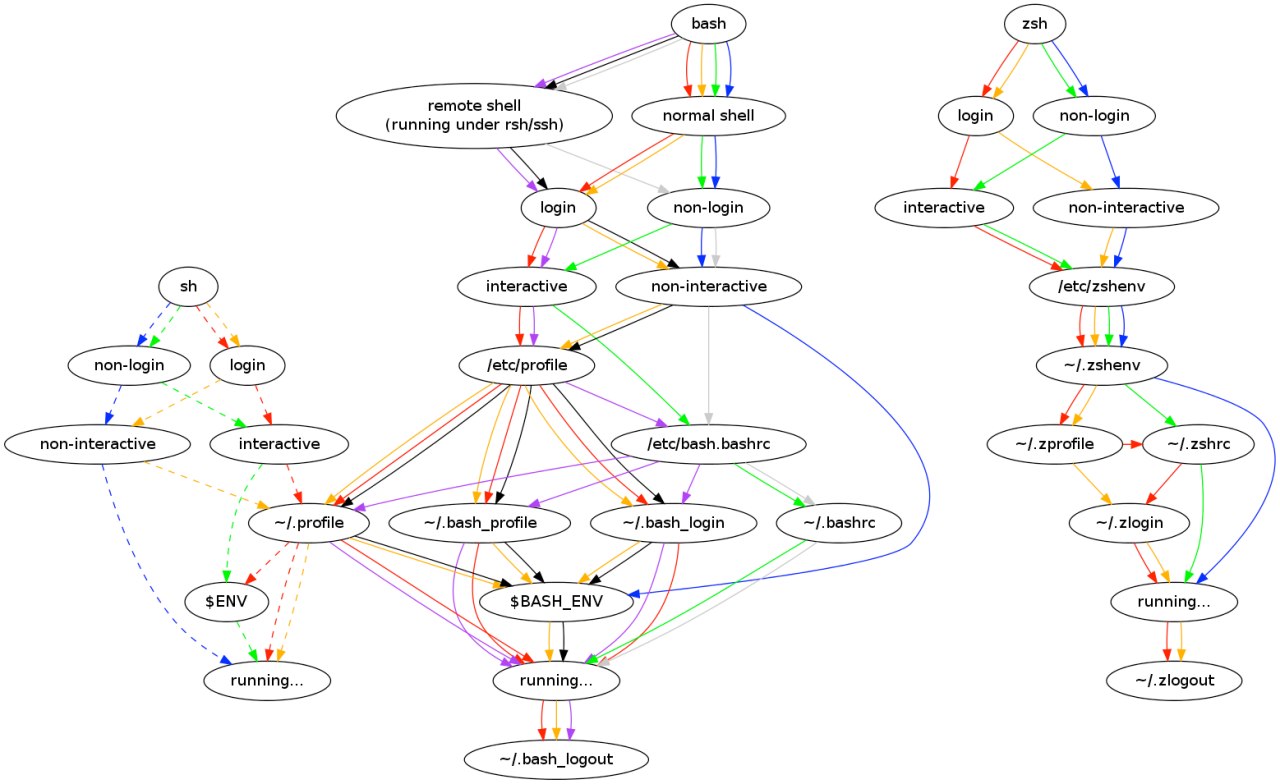In Elixir, we mark statuses by using a question mark at the end of the variable name. Something like this:
authorized? = user |> get_something() |> ensure_authorized?()
I like this better than the is_ prefix
In Elixir, we mark statuses by using a question mark at the end of the variable name. Something like this:
authorized? = user |> get_something() |> ensure_authorized?()
I like this better than the is_ prefix
so not sure why you think one or the other is less complicated
Because of this:

And some note by the author of the scheme:
Unfortunately, the operation of bash startup scripts is dependent on patches added by OS distributions
Why should I guess at the tea leaves instead of just using deterministic zsh?
console.log() is really easy to learn, but what happens after that is a complete "wtf"
Bash has a very strange sequence of sourcing scripts like .bash_profile and others, and the type of shell (interactive or not) adds fuel to the fire. There is no chance to sort through this bunch of init files in order to correctly and conveniently set up environment variables. In zsh, only 3 files are needed for proper configuration; it couldn’t be easier.
Why don't you just remove all plugins and use standard zsh? All sorts of oh-my-soy are not really needed.
The language idea is good, but: THREE.WebGLRenderer: A WebGL context could not be created. Reason: WebGL is currently disabled.
Seriously? Why do I need WebGL to read TEXT in docs? :/
I used DuckDuckGo a couple of years ago, but they added their own blacklist of sites (pretty stupid), and for my language it started returning crappy generated spam sites instead of relevant results. They shouted at the top of their lungs that for my language they simply index the results from Yandex, but this is a lie, they are different.
StartPage gave the best results, but they introduced a captcha that I got every damn request.
I'm currently using SearXNG, which collects results from Google. And these are damn normal results, unlike other search engines that consider themselves the smartest and edit the results.
EndeavorOS offers a choice of systemd-boot and GRUB. So, if you don't have GRUB, you probably have systemd-boot.
Some "pro" guys on YT will probably point you to https://github.com/codecrafters-io/build-your-own-x and https://github.com/practical-tutorials/project-based-learning. But...
I don't recommend reinventing the wheel if you want to gain REAL development skills. Development is really about achieving your goal using existing (and preferably popular) solutions.
It makes no sense to write any system-level projects from scratch in 2024 if projects with a similar purpose already exist. Try using them as a regular user. Maybe you will find features that you would like to fix or add.
It would be better for your nerves to just do a normal GNU/Linux installation. There are too many ways the installation can go wrong:
For example, Ubuntu ISO has a size of 5.7G. But my swap, which you previously deactivated, was 4G. Either 2G, or it didn't exist at all.
The other partition may not exist or may have capacity smaller than C:/.
The installed Linux must also be stored somewhere. And there is also a copy partition for C. The same problem of lack of space.
From %APPDATA%? You would have to be a know-it-all to resolve the location paths and configuration names of literally every existing program.
~~And it is at this moment that Windows will completely randomly decide to update and rewrite the bootloader :)~~